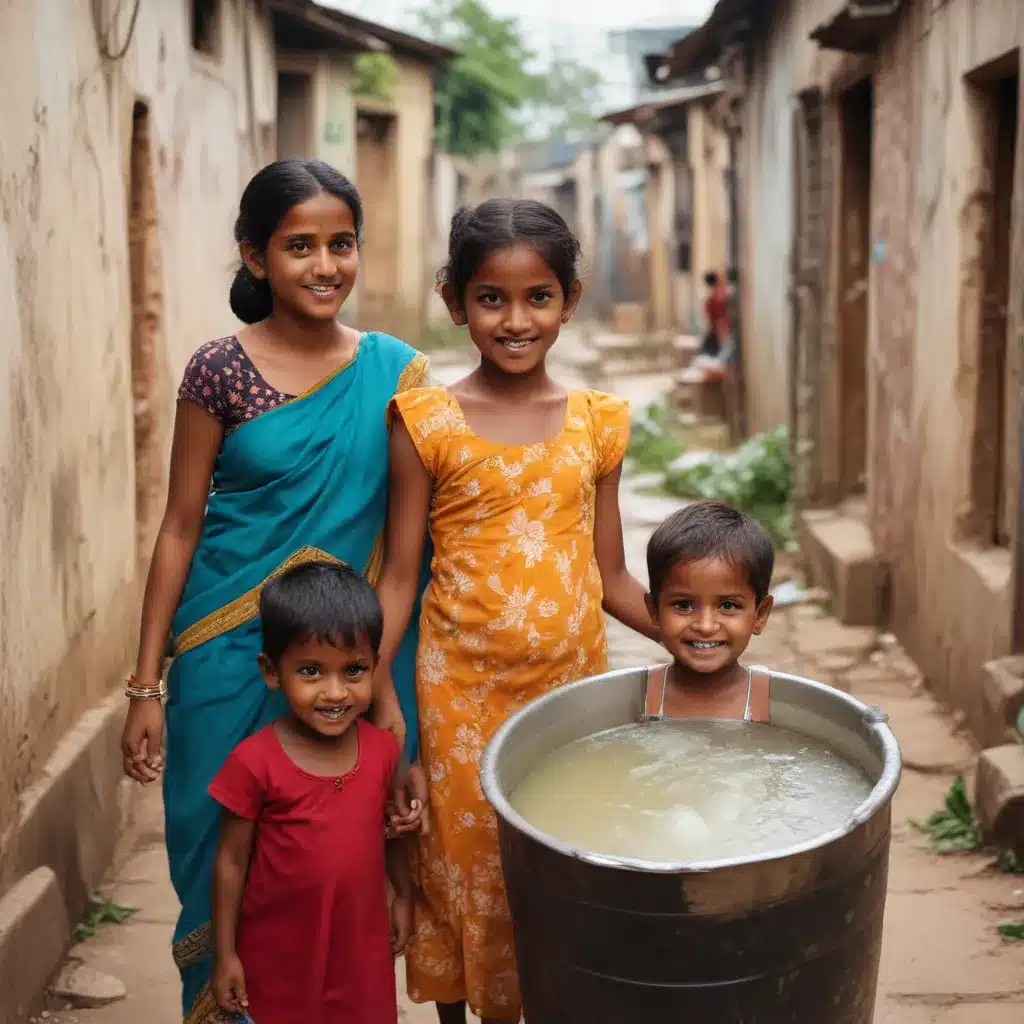
Transforming Urban Slums Through Community-Led WASH and Nutrition Programs
The global water and sanitation crisis has long plagued communities in low- and middle-income countries, contributing to poor health outcomes, especially for women and children. In the bustling city of Hyderabad, India, urban slums face a particularly dire situation, where inadequate access to clean water, proper sanitation, and hygiene education perpetuates cycles of disease, malnutrition, and stunting.
However, an innovative approach is emerging that harnesses the power of community engagement to drive transformative change. By integrating water, sanitation, and hygiene (WASH) interventions with nutrition programs, local organizations are tackling this multifaceted challenge head-on, empowering slum residents to improve their health and well-being.
Joint Action for Water, a leading WASH advocacy group, has been at the forefront of this integrative effort in Hyderabad. Drawing on the latest research and best practices, they have pioneered a comprehensive strategy that addresses the root causes of poor WASH and nutrition outcomes in urban slums.
Strengthening Community Ownership Through Women’s Collectives
At the heart of this approach is the mobilization and empowerment of women’s self-help groups (SHGs) – a cornerstone of India’s National Rural Livelihoods Mission (NRLM). By leveraging these existing community-based organizations, Joint Action for Water has been able to foster grassroots ownership and drive sustainable change.
“Women in these slums are the backbone of their families and communities,” explains Nisha Agrawal, the organization’s director of community engagement. “By equipping them with the knowledge, resources, and leadership skills to address WASH and nutrition challenges, we’re catalyzing a ripple effect of positive impact.”
The program begins by training a cadre of “Nutrition Friends” (Poshan Sakhis) and “Agriculture Friends” (Krishi Mitras) from within the SHGs. These community champions undergo intensive capacity building on integrated nutrition planning, MUAC screening, and facilitating participatory learning and action (PLA) sessions.
Armed with this knowledge, the Poshan Sakhis and Krishi Mitras then work closely with their peers to develop localized action plans, known as “Poshan Microplans.” These community-driven blueprints identify priority issues, map available resources, and outline strategies to improve access to essential WASH and nutrition services.
Research from urban slums in Kolkata has shown that even when infrastructure is in place, lingering behavioral and social barriers can undermine the effectiveness of WASH interventions. By centering the SHGs in the design and implementation process, the Hyderabad program ensures that solutions are tailored to local realities and have strong community buy-in.
Integrating WASH and Nutrition for Holistic Impact
The Hyderabad program’s WASH and nutrition integration takes shape through a multifaceted approach:
1. Strengthening WASH Service Delivery
The program works closely with local government agencies to improve the coverage and quality of water, sanitation, and hygiene services in the slums. This includes training frontline health workers, optimizing the scheduling of community-based WASH events, and ensuring the consistent availability of essential commodities like soap and sanitary pads.
2. Nutrition-Sensitive Agriculture
Recognizing the links between food security, dietary diversity, and child health, the program supports the establishment of household-level kitchen gardens and backyard poultry. Krishi Mitras provide technical guidance, facilitate farmer field schools, and connect families to relevant government schemes.
3. Behavior Change Communication
Poshan Sakhis lead interactive PLA sessions that empower women to adopt optimal nutrition, hygiene, and childcare practices. These sessions cover topics ranging from handwashing and menstrual health to complementary feeding and growth monitoring.
4. Targeted Nutrition Support
The program identifies “nutritionally at-risk” pregnant women and children through MUAC screening and ensures they receive specialized counseling, home visits, and access to supplementary feeding programs.
Research from a similar program in India’s eastern states has shown that this holistic, community-led approach can significantly improve the utilization of essential health and nutrition services, as well as key indicators like dietary diversity and the prevalence of undernutrition.
Catalyzing Systemic Change Through Advocacy and Partnerships
While the on-the-ground interventions are crucial, Joint Action for Water recognizes the importance of advocating for broader policy and institutional reforms. The organization actively engages with local and state governments, leveraging evidence to push for increased investment in urban WASH and nutrition programs.
“Sustainable change requires working at multiple levels,” says Agrawal. “We’re not just empowering communities, but also influencing the systems that shape their access to essential services and resources.”
To this end, Joint Action for Water has forged strategic partnerships with academic institutions, civil society organizations, and international development agencies. This cross-sectoral collaboration enables the exchange of knowledge, the co-creation of innovative solutions, and the amplification of the program’s impact.
For example, a study in Kolkata’s urban slums highlighted the importance of integrating food hygiene education into WASH initiatives. Joint Action for Water has since incorporated these insights, empowering women’s groups to address both water quality and food safety practices.
Investing in the Next Generation
At the heart of Joint Action for Water’s mission lies a deep commitment to improving the health and well-being of children in Hyderabad’s urban slums. By holistically addressing the WASH and nutrition needs of families, the program is laying the foundation for a brighter, more equitable future.
“When children have access to clean water, proper sanitation, and nutritious food, they have a much better chance of reaching their full potential,” says Agrawal. “That’s what drives us – the knowledge that our work can transform lives and unlock endless possibilities for the next generation.”
As the program continues to evolve and expand, Joint Action for Water remains steadfast in its pursuit of sustainable, community-led solutions. By integrating WASH and nutrition interventions, the organization is paving the way for more resilient, thriving urban communities in Hyderabad and beyond.

